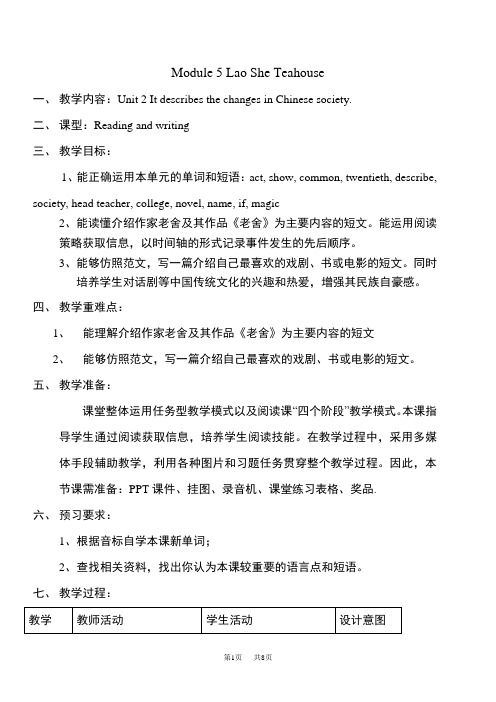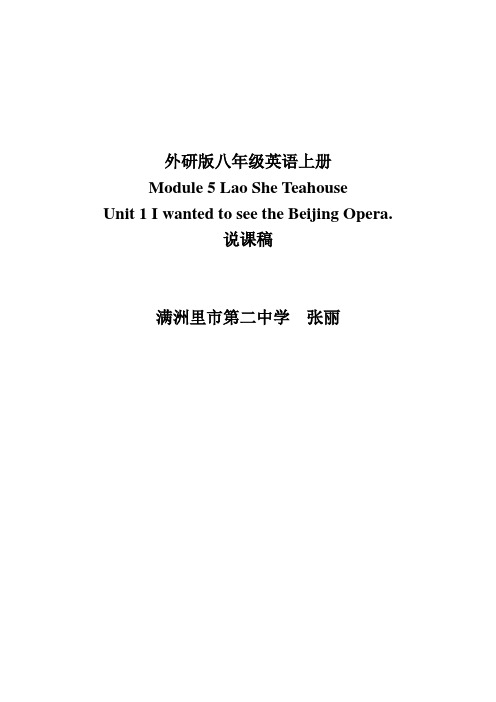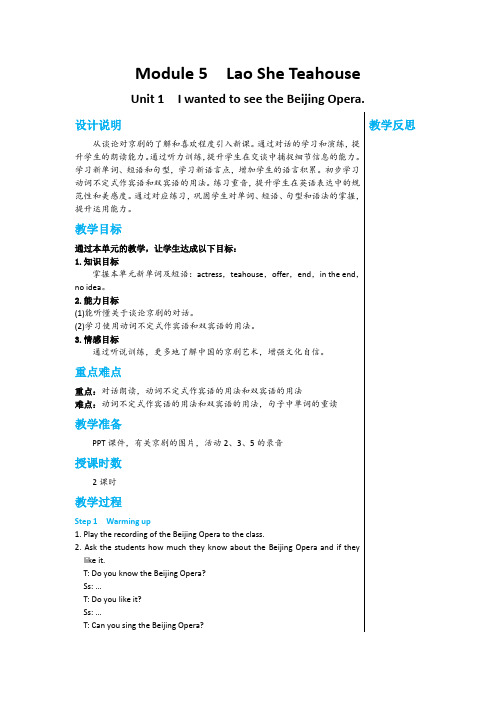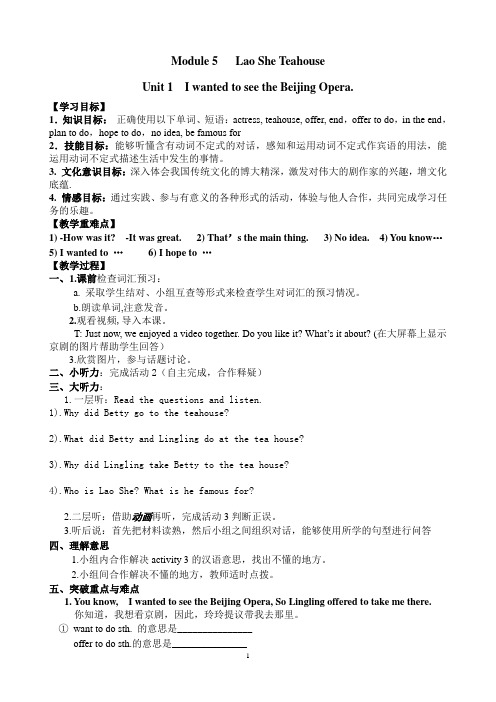Module5LaoSheTeahouse教案
初中八年级英语上册外研版Module 5 Lao She Teahouse 教学设计 (2)

Module 5 Lao She Teahouse
一、教学内容:Unit 2 It describes the changes in Chinese society.
二、课型:Reading and writing
三、教学目标:
1、能正确运用本单元的单词和短语:act, show, common, twentieth, describe, society, head teacher, college, novel, name, if, magic
2、能读懂介绍作家老舍及其作品《老舍》为主要内容的短文。
能运用阅读
策略获取信息,以时间轴的形式记录事件发生的先后顺序。
3、能够仿照范文,写一篇介绍自己最喜欢的戏剧、书或电影的短文。
同时
培养学生对话剧等中国传统文化的兴趣和热爱,增强其民族自豪感。
四、教学重难点:
1、能理解介绍作家老舍及其作品《老舍》为主要内容的短文
2、能够仿照范文,写一篇介绍自己最喜欢的戏剧、书或电影的短文。
五、教学准备:
课堂整体运用任务型教学模式以及阅读课“四个阶段”教学模式。
本课指导学生通过阅读获取信息,培养学生阅读技能。
在教学过程中,采用多媒体手段辅助教学,利用各种图片和习题任务贯穿整个教学过程。
因此,本节课需准备:PPT课件、挂图、录音机、课堂练习表格、奖品.
六、预习要求:
1、根据音标自学本课新单词;
2、查找相关资料,找出你认为本课较重要的语言点和短语。
七、教学过程:。
外研8上M5U1教学设计

外研版八年级英语上册Module 5 Lao She TeahouseUnit 1 I wanted to see the Beijing Opera.说课稿满洲里市第二中学张丽Module 5 Lao She TeahouseUnit 1 I wanted to see the Beijing Opera.本节课的授课内容是外研版八年级上册第五模块第一单元,是一节听说课,本次说课我讲从以下几个方面进行:一、教材分析(一)教材的地位和作用本模块以老舍以及老舍茶馆为话题,介绍了作家老舍、老舍茶馆以及话剧《茶馆》等相关内容,借此让学生了解像老舍这样的在中国文坛中有着重要影响的作家及京剧、话剧等中国传统文化。
通过一系列活动引导学生学习动词不定式作宾语的用法,并为他们运用目标语言创设了真实而多样的情境。
本节课是第一单元听说课,以玲玲带贝蒂前往老舍茶馆看京剧为主题,讲述了贝蒂在茶馆内的所见所闻,并简单介绍了京剧、作家老舍及其代表作《茶馆》。
这段对话以谈论中国国粹----京剧为主线,穿插使用了动词不定式作宾语的句子,教学情境自然生动,有利于激发学生对祖国传统文化的热爱。
这节听说课是本模块新知的输入和口头巩固过程,是模块总任务的语言知识铺垫过程。
(二)教学目标的确立和依据为了不仅要完成正常的教学任务,还要有效地培养学生的创新精神和实践能力,确定如下教学目标:1、知识目标:能够听说读写重点词汇和短语: actress, teahouse, offer, end, in the end能够理解和正确使用动词不定式:plan to do ... , hope to do... ,want to do..., offer to do...2、能力目标: a.能够听懂对话的大意。
b.能捕捉听力材料中的详细具体信息。
c.能灵活运用动词不定式短语3、情感目标:了解中国国粹----京剧,激发学生对祖国传统文化的热爱。
(三)重点和难点1、重点:根据新课程标准对听的能力的要求,我确定本课重点为培养学生的听力技巧,运用重点词汇语言进行交际的能力。
2024-2025学年外研版初中英语八年级(上)教案Module5Unit1

Module 5Lao She TeahouseUnit 1I wanted to see the Beijing Opera.设计说明教学反思从谈论对京剧的了解和喜欢程度引入新课。
通过对话的学习和演练,提升学生的朗读能力。
通过听力训练,提升学生在交谈中捕捉细节信息的能力。
学习新单词、短语和句型,学习新语言点,增加学生的语言积累。
初步学习动词不定式作宾语和双宾语的用法。
练习重音,提升学生在英语表达中的规范性和美感度。
通过对应练习,巩固学生对单词、短语、句型和语法的掌握,提升运用能力。
教学目标通过本单元的教学,让学生达成以下目标:1.知识目标掌握本单元新单词及短语:actress,teahouse,offer,end,in the end,no idea。
2.能力目标(1)能听懂关于谈论京剧的对话。
(2)学习使用动词不定式作宾语和双宾语的用法。
3.情感目标通过听说训练,更多地了解中国的京剧艺术,增强文化自信。
重点难点重点:对话朗读,动词不定式作宾语的用法和双宾语的用法难点:动词不定式作宾语的用法和双宾语的用法,句子中单词的重读教学准备PPT课件,有关京剧的图片,活动2、3、5的录音授课时数2课时教学过程Step 1Warming up1. Play the recording of the Beijing Opera to the class.2. Ask the students how much they know about the Beijing Opera and if theylike it.T: Do you know the Beijing Opera?Ss: …T: Do you like it?Ss: …T: Can you sing the Beijing Opera?Ss: …Step 2PresentationWork in pairs. Look at the pictures and talk about them. Use the words in the box to help you. (Activity 1 on Page 34)1. Ask the students to look at the pictures.2. Tell them to read through the words and make sure they know the meaningactress dance music play sing teahouse theatre traditional3. Ask them to describe the pictures in pairs.4. Encourage some pairs to present their conversations.Step 3Listening1. Let the students listen and underline the correct words or expressions. (Activity 2 on Page 34)(1) Ask the students to read the three sentences.(2) Play the recording and ask the students to choose the correct answers.(3) Have the students check answers with their partners.(4) Check answers and read full sentences with the students.Answers: 1 wants to see 2 doesn’t know 3 difficult(5) Play the recording again. Show the tapescript if necessary.Step 4Listening and reading1. Introduce the playwright Lao She and his play Teahouse to the class.2. Play the recording and ask the students to check the true sentences. (Activity3 on P35)(1) Read through the sentences and try to understand them.(2) Listen to the recording. Then check the true sentences.(3) Elicit the answers from the class.Answers: 3√4√5√3. Listen again and try to get answers to the question.1. Who went to Lao She Teahouse last night?2. Did Betty like the Beijing Opera?3. How long did they stay there in the end?4. Does Lingling often go to see the Beijing Opera?5. What is Lao She famous for?(1) Ask the students to read through the sentences and try to understand them.(2) Listen to the recording and try to get the answers. Allow some students toread the conversation if they still can’t get the answers after listening.(3) Elicit answers in full sentences for the class.Answers:1 Lingling and Betty.2 Yes, she did.3 They stayed there for three hours.4 No, she doesn’t.5 He is famous for his play Teahouse.4. Read the conversation again and find out the following phrases. Try to5. Listen to the conversation and read it.(1) Ask the students to listen to the recording and then try to read the conversation on their own.(2) Ask or encourage some students to read the conversation. Correct their mistakes.(3) Ask some students to practice the conversation in different roles.Step 5PracticeComplete the passage with the correct form of the words in the box. (Activity 4 on Page 35)(1) Read through the words in the box.complete it with the correct form of the words in the box on their own.(3) Check answers in groups.(4) Elicit answers from the class.Answers:(1) offered (2) difficult(3) actresses (4) end (5) mainStep 6Language points1. You know,I wanted to see the Beijing Opera,so Lingling offered to take me there. 你知道,我想看京剧,因此玲玲主动提出带我去那儿。
八年级英语上册 Module 5 Lao She's Teahouse Unit 1 I wante

Unit 1 I wanted to see the Beijing Opera.导入一语句导入—Good morning, Daming! I would like to go to Lao She Teahouse. Do you want to go with me?—Yes, I do. Why do you want to go there?—To see the Beijing Opera.…导入二多媒体课件导入通过多媒体屏幕向学生展示京剧脸谱的图片(详见光盘课件),图文并茂,师生互动,直接导入新课。
T: Do you know about these photos?S1: Yes, they are from “京剧”.T: Oh, you don't know how to say “京剧” in English. Follow me: Beijing Opera.Ss: Beijing Opera.(重复几遍直到学生掌握了)T: China is famous for the Beijing Opera. Some foreigners also like it. Now let's see how Betty went to see the Beijing Opera.导入三情境导入创设一个全家人看京剧的场景,让学生说说谁最喜欢看京剧,并说说他/她对京剧的看法,然后引入新课。
S1: My grandmother enjoys the Beijing Opera a lot. She often sees it on TV and sometimes she listens to it on the radio. She thinks the Beijing Opera is wonderful.S2: My father likes the Beijing Opera best. When he doesn't work, he sees it on TV. And he can also sing some. In his eyes, the Beijing Opera is the best music.S3: …活动一Pair work教材Activity 1 (教学目的:通过两两对话,既练习词汇,又为下面的听力做准备)学生两人一组互相问答,利用给出的词汇对图片进行描述,为听力和对话做话题和语言上的铺垫。
Module 5 Lao She Teahouse

Module 5 Lao She TeahouseUnit 1 I wanted to see the Beijing Opera.【学习目标】1.知识目标:正确使用以下单词、短语:actress, teahouse, offer, end,offer to do,in the end,plan to do,hope to do,no idea, be famous for2.技能目标:能够听懂含有动词不定式的对话,感知和运用动词不定式作宾语的用法,能运用动词不定式描述生活中发生的事情。
3. 文化意识目标:深入体会我国传统文化的博大精深,激发对伟大的剧作家的兴趣,增文化底蕴.4. 情感目标:通过实践、参与有意义的各种形式的活动,体验与他人合作,共同完成学习任务的乐趣。
【教学重难点】1) -How was it? -It was great. 2) That’s the main thing. 3) No idea. 4) You know…5) I wanted to …6) I hope to …【教学过程】一、1.课前检查词汇预习:a. 采取学生结对、小组互查等形式来检查学生对词汇的预习情况。
b.朗读单词,注意发音。
2.观看视频,导入本课。
T: Just now, we enjoyed a video together. Do you like it? What’s it about? (在大屏幕上显示京剧的图片帮助学生回答)3.欣赏图片,参与话题讨论。
二、小听力:完成活动2(自主完成,合作释疑)三、大听力:1.一层听:Read the questions and listen.1).Why did Betty go to the teahouse?2).What did Betty and Lingling do at the tea house?3).Why did Lingling take Betty to the tea house?4).Who is Lao She? What is he famous for?2.二层听:借助动画再听,完成活动3判断正误。
外研版英语八年级上册Module5《LaoShe’sTeahouse》(Unit3)说课稿1

外研版英语八年级上册Module 5《Lao She’s Teahouse》(Unit 3)说课稿1一. 教材分析《Lao She’s Teahouse》是人教版英语八年级上册Module 5的一篇文章,主要介绍了老舍的茶馆文化。
文章通过描述茶馆中的人物和故事,反映了我国旧社会的风俗习惯和社会状况。
本模块的学习目标是让学生能够理解并运用相关词汇和句型,描述人物和事件,表达自己的观点和感受。
二. 学情分析八年级的学生已经具备了一定的英语基础,能够听、说、读、写一些简单的句子。
但他们在阅读理解方面还存在一定的困难,尤其是对于长篇文章的理解和分析。
因此,在教学过程中,我们需要关注学生的阅读理解能力,帮助他们掌握相关词汇和句型,提高他们的英语应用能力。
三. 说教学目标1.知识目标:让学生掌握文章中出现的关键词汇和句型,能够运用所学知识描述人物和事件。
2.能力目标:培养学生独立阅读和理解长篇文章的能力,提高他们的英语阅读水平。
3.情感目标:通过学习文章,让学生了解我国茶馆文化,增强对传统文化的认识和尊重。
四. 说教学重难点1.重点:文章中出现的关键词汇和句型。
2.难点:对于文章中一些细节内容的理解和分析,以及如何运用所学知识进行实际应用。
五. 说教学方法与手段1.采用任务型教学法,让学生在完成任务的过程中,自然而然地学习和掌握相关知识。
2.利用多媒体教学手段,如图片、视频等,帮助学生更好地理解和记忆文章内容。
3.学生进行小组讨论和分享,激发他们的学习兴趣和主动性。
六. 说教学过程1.导入:通过展示茶馆的图片,引导学生谈论我国茶馆文化,激发学生的学习兴趣。
2.阅读理解:让学生独立阅读文章,回答相关问题,检测他们的阅读理解能力。
3.词汇学习:引导学生学习文章中出现的关键词汇和句型,进行实际应用练习。
4.小组讨论:学生进行小组讨论,分享他们对文章内容的理解和感悟。
5.课堂总结:对文章进行总结,强调其中的重点知识和观点。
外研版英语(新标准)八年级上册Module 5 Lao She Teahouse Unit 2 教案
Unit 2 It describes the changes in Chinese society.ⅠTeaching modelReading and writing.ⅡTeaching methodTop-down approachⅢTeaching aims1. Listening and understanding familiar topics (Beijing Opera) finding specificinformation.2. Describing intentions and plans in simple language.3. Reading and understanding the sequence of events.4. Writing a short passage about favourite play or film.ⅣTeaching Objectives1. Key vocabulary: act, show, common, describe, society, beginning, headteacher, college, novel, if, magic2. Keys structure: Infinitive structures (1): infinitives as objects; verbs followed by infinitives.ⅤTeaching aidsRecorder, OHP, videoⅥTeaching StepsStep 1 Warming-up1. Enjoy a play: Lao She Teahouse2. Review the text of Unit 1.3. Show some pictures.4. Look at the pictures, and talk something about the pictures.5. Introduce the new words.6. Learn the new words.7. Read the new words.Step 2 Work in pairs.1. Ask and answer questions about Lao She.1) What do you know about Lao She?2) What are his most famous books and plays?3) What’s the special about Lao She Teahouse?2. Tell the students about Lao She.Lao She (1899-1966) was one of the most renowned contemporary Chinese writers, famous for his novels and plays. His works have been translated into over 20 foreign languages.Step 3 Reading1. Play the recording and listen to the tape carefully.2. Ask the students to read through the passage.3. Read the passage by themselves.4. Read the text together.5. Read the passage and match the headings with the paragraphs in Activity 2.6. Check with a partner.7. Call back the answers from the whole class.Keys: 1 b 2 c 3 aStep 4 Complete the timeline.1. Read the passage again.2. Complete the timeline with information about Lao She.LAO SHE1957 ____________________________________1924 ____________________________________1918 ____________________________________1913 ____________________________________1899 born in Beijing3. Check with a partner.4. Call back the answers from the whole class.Keys:1957 He wrote Teahouse.1924 He left home and went to England.1918 He finished the teacher’s school and became a head teacher of a primary school.1913 His mother sent him to a teacher’s school.Step 5 Complete the table.Keys: three, the customers of his teahouse, teachers’ school, Chinese, twentieth, magic showsStep 6 Complete the passage.1. Ask the students to read the words in the box in Activity 4.2. Ask the students to read through the passage in Activity 4.Lao She’s play, Teahouse, has three acts. It describes the life of Wang Lifa andthe changes to the lives of (1) ________ people in Chinese (2) ________ in the first half of the twentieth (3) _______.Lao She went to a teacher’s school in Beijing, taught in London, and later returned to China. He is one of China’s greatest (4) ________.Come to Lao She Teahouse in Beijing (5)__________ you like Beijing Opera, traditional music or (6) ________ shows.3. Complete the passage with the correct form of the words from the box.4. Check with a partner.5. Call back the answers from the whole class.Keys: 1. common 2. society 3. century 4. writers 5. if 6. magicStep 7 Learning to learnWhen you read a passage, remember to look at its title, the paragraph headings and the photos if there are any. They will help you understand the main ideas. Step 8 Writing1. Complete the table.2. Write sentences about Teahouse with the information in Activity 5. Use the passage in Activity 2 to help you.The story of Teahouse takes place in Beijing.Now join the sentences. Write a passage about Teahouse.3. Write a passage about your favourite play or film. Use Activities 5 and 6 to help you.Step 9 Language points1. … and was named “People’s Artist” Lao She is one of the greatest Chinese writes of the twentieth century.(他)被誉为“人民艺术家”,老舍是20世纪中国最伟大的作家之一。
Module 5 Unit 1教学设计外研版八年级上册英语教学设计
说课稿Module 5 Lao She TeahouseUnit 1 I wanted to see the Beijing Opera一、教材分析1.教材的地位和作用:本模块围绕老舍的作品《茶馆》以及北京老舍茶馆展开,内容涉及老舍茶馆、老舍个人生平以及著名话剧《茶馆》。
Unit1主要讲述的是Lingling带Betty去老舍茶馆看京剧和Betty在欣赏完京剧的感想。
对话的末尾提及“Lao She is a great writer. He’s especially famous for his play Teahouse.”为Unit2的展开提供了方向。
本单元的生词量不大,重点语法为动词不定式。
2.教学目标(1)知识目标:能掌握本单元的重点单词和句型:1)Teahouse, offer, end, in the end, no idea2) I wanted to see the Beijing Opera, so Lingling offered to take me there. We only planned to watch for an hour...I hope to understand more next time.(2)能力目标:1)能理解关于关于在茶馆看京剧并含不定式的对话大意,听取相关细节信息。
2)通过跟读和小组练习,能够较流畅的朗读对话。
3)通过小组合作,能尝试运用所学的单词和句型进行有关计划的对话。
(3)情感目标:能够体验中国的传统文化,培养了解中国传统文化的兴趣和合作学习的精神。
3.教学重点难点重点:offer to, plan to, hope to, want to等在对话中的运用。
难点:用不定式进行有关计划的对话。
二、教法学法为了达到本节课的教学目标,突破重点难点,遵循《义务教育英语课程标准(2011年版)》的要求,即从学生的学习兴趣、生活经验和认知水平出发来设计教学活动,倡导体验、实践、参与、合作与交流的学习方式,本节课主要体现了以下教法学法的理念:情境教学法——通过音乐、图片、视频等方式创设语言情境,丰富学生的直观感受,让学生在情境中学在情境中说。
外研版八上Module5《Lao She's Teahouse》word学案
Module 5 Lao She TeahouseUnit 1 I want to see the Beijing Opera一、课前预习1.朗读并默写本单元单词actress, teahouse, offer, end, in the end, no idea2.思考并回答下列问题:1. 老舍是什么人?2. 你对Lao She有什么了解?3. 你读过老舍的什么作品?4. 你听说过戏剧《茶馆》吗?5. 你认为人们在老舍茶馆里能做些什么?3.Activity 1:(1)朗读并理解方框中的单词,(2)看图,用方框中的单词描述图片.4.Activity 2:(1)阅读句子并理解句子的意思;(2)注意句子的两个选项的区别,不听力作好准备.5.Activity 3: (1) 朗读对话; (2) 理解对话二、课堂练习1. 听录音完成下列填空a)Why did Betty go Lao She teahouse last night? _____________b)What did they do at the teahouse? __________________c)Did Betty understand the opera? _________________d)How long did they plane to stay? _____.2.次朗读对话,并完成对话后的句子。
3. 完成Activity 4,7三、重点词组及语法:1. 重点词组want to see, offer to take, it is difficult to understand, plan to watch, in the end, interesting, hope to understand, go to see, want to take, be famous for2. 语法点:动词不定式及其用法------ 阅读课本P126动词不定式作宾语生活中我们经常遇到“我努力去理解” “决定留下来”等表达方式,其中连续出现了两个动词,这种情况下英语应该如何表达呢?首先请看下面的例句:We decided to stay for a cup of tea.我们决定留下来喝杯茶。
Module 5 Lao She Teahouse 教案新部编本
教师学科教案[ 20 – 20 学年度第__学期]任教学科:_____________任教年级:_____________任教老师:_____________xx市实验学校Module 5 Lao She Teahouse一、学习目标:A. 单词和短语:actress, teahouse, offer, end, in the end, no idea, act, show, common, describe, society, head teacher, college, novel, if, magicB. 交际用语:1. How was it?2. You know, …3. That’s the main thing.4. No idea.5. — Do you want to see the Beijing opera?—Yes, I’d love to.6. — Do you want to come to Lao She Teahouse with me?—Yes, please. I’d like to go with you.7. I wanted to see the Beijing Opera.8. Lingling offered to take me there.9. We only planned to watch for an hour.10. We decided to stay for three hours.11. I hope to understand more next time.12. — I want to see the Beijing Opera.— Why d on’t we …?二、教学目标1. Function: Talking about intentions and plans.2. Structure: Infinitive structures (1): infinitives as objects; verbs followed by infinitives.3. Skills:1) Listening and understanding familiar topics (Beijing Opera) finding specific information.2) Describing intentions and plans in simple language.3) Reading and understanding the sequence of events.4) Writing a short passage about favourite play or film.4. Around the world: Theatres5. Task: Acting out a scene from a play.三、重点及难点:Infinitive structures (1): infinitives as objects; verbs followed by infinitives.四、教学设计:Unit 1 I wanted to see the Beijing Opera.ⅠTeaching modelListening and speakingⅡTeaching methodPWP approachⅢ Teaching aims1. Key vocabulary: actress, teahouse, offer, end, in the end, no idea2. Key structures:Infinitive structures (1): infinitives as objects; verbs followed by infinitives.3. Key sentences:1) How was it?2) You know, …3) That’s the main thing.4) No idea.5) — Do you want to see the Beijing opera?—Yes, I’d love to.6) — Do you want to come to Lao She Teahouse with me?—Yes, please. I’d like to go with you.7) I wanted to see the Beijing Opera.8) Lingling offered to take me there.ⅣTeaching aidsTape recorder, OHP, videoⅤTeaching StepsStep 1 Warming-up1. Enjoy a play: Lao She Teahouse2. Show some pictures.3. Look at the pictures, and talk something about the pictures.4. Introduce the new words.5. Learn the new words.6. Read the new words.Step 2 Work in pairs.1. Ask the students to read the words in the box in Activity 1.2. Look at the pictures in Activity 1, and talk about them.3. Work in pairs. Use the words from the box to help you.Step 3 Listening practice.1. Ask the students to read through the sentences in Activity2.1) Betty often sees / wants to see some traditional Beijing opera.2) Betty knows / doesn’t know Lao She Teahouse.3) Lingling says that the opera is easy / difficult to understand.2. Play the recording once without stopping.3. Listen and underline the correct words.4. Play the recording again and ask the whole class to check with a partner.5. Check the answers:Keys: 1. wants 2. doesn’t know 3. difficultStep 4 Listen and read.1. Show some pictures, and ask the students to talk about them.2. Ask the students to read the conversation silently.3. Play the recording and ask the students to listen and read the conversation.4. Read the conversation.5. Act it out.6. Learn “Everyday English”1) How was it?2) You know, …3) That’s the main thing.4) No idea.Step 5 Check the true sentences.1. Ask the students to read the conversation again.2. Now check the true sentences.1) Tony went to Lao She Teahouse with Betty and Lingling.2) Betty understood the opera.3) Lingling and Betty stayed longer than they planned.4) Betty enjoyed the opera.5) Betty would like to go to the opera again.6) Betty knew about Lao She before she went to the teahouse.3. Ask the students to check with a partner.4. Check the answers:Keys: 1. ×2. ×3. √4. √5. √6.×Step 6 Complete the passage.1. Ask the students to read the words in the box in Activity 4.2. Read through the passage.Betty wanted to see the Beijing opera, so Lingling (1) ________ to take Betty to Lao She Teahouse. The words of the opera were (2) ________ to understand, but the actors and (3)__________ were excellent. They only planned to watch for an hour, but in the (4) ________, they stayed for three hours. Betty thought it was interesting — that was the (5) ________ thing!3. Complete the passage with the correct form of the words from the box.4. Ask the students to check with a partner.5. Check the answers:Keys: 1. offered 2. difficult 3. actresses 4. end 5. mainStep 7 Listen and repeat.1. Play the recording once without stopping.2. Play the recording again and ask the whole class to repeat.1) — Do you want to see the Beijing opera?—Yes, I’d love to.2) — Do you want to come to Lao She Teahouse with me?—Yes, please. I’d like to go with you.3. Ask the students to listen and mark the intonation.4. Now listen again and repeat.Step 8 Work in pairs.1. Ask the students to read the conversations in Activity 5 aloud.2. Make true sentences.1) I want to ___________ next week.2) They offered to ___________.3) I hope to ___________ one day.4) My parents agree to ____________ on Saturday.3. Talk about something you’d like to do or see.— I want to go to Xinjiang and ride horses.—…Step 9 Important and difficult points1. — Who is Lao She? 老舍是谁?— No idea. 不知道。
- 1、下载文档前请自行甄别文档内容的完整性,平台不提供额外的编辑、内容补充、找答案等附加服务。
- 2、"仅部分预览"的文档,不可在线预览部分如存在完整性等问题,可反馈申请退款(可完整预览的文档不适用该条件!)。
- 3、如文档侵犯您的权益,请联系客服反馈,我们会尽快为您处理(人工客服工作时间:9:00-18:30)。
Module 5 Lao She Teahouse 一、学习目标: A. 单词和短语: actress, teahouse, offer, end, in the end, no idea, act, show, common, describe, society, head teacher, college, novel, if, magic B. 交际用语: 1. How was it? 2. You know, … 3. That’s the main thing. 4. No idea. 5. — Do you want to see the Beijing opera? — Yes, I’d love to. 6. — Do you want to come to Lao She Teahouse with me? — Yes, please. I’d like to go with you. 7. I wanted to see the Beijing Opera. 8. Lingling offered to take me there. 9. We only planned to watch for an hour. 10. We decided to stay for three hours. 11. I hope to understand more next time. 12. — I want to see the Beijing Opera. — Why don’t we …? 二、教学目标 1. Function: Talking about intentions and plans. 2. Structure: Infinitive structures (1): infinitives as objects; verbs followed by infinitives. 3. Skills: 1) Listening and understanding familiar topics (Beijing Opera) finding specific information. 2) Describing intentions and plans in simple language. 3) Reading and understanding the sequence of events. 4) Writing a short passage about favourite play or film. 4. Around the world: Theatres 5. Task: Acting out a scene from a play. 三、重点及难点: Infinitive structures (1): infinitives as objects; verbs followed by infinitives. 四、教学设计: Unit 1 I wanted to see the Beijing Opera. ⅠTeaching model Listening and speaking ⅡTeaching method PWP approach Ⅲ Teaching aims 1. Key vocabulary: actress, teahouse, offer, end, in the end, no idea 2. Key structures: Infinitive structures (1): infinitives as objects; verbs followed by infinitives. 3. Key sentences: 1) How was it? 2) You know, … 3) That’s the main thing. 4) No idea. 5) — Do you want to see the Beijing opera? — Yes, I’d love to. 6) — Do you want to come to Lao She Teahouse with me? — Yes, please. I’d like to go with you. 7) I wanted to see the Beijing Opera. 8) Lingling offered to take me there. Ⅳ Teaching aids Tape recorder, OHP, video ⅤTeaching Steps Step 1 Warming-up 1. Enjoy a play: Lao She Teahouse 2. Show some pictures. 3. Look at the pictures, and talk something about the pictures. 4. Introduce the new words. 5. Learn the new words. 6. Read the new words. Step 2 Work in pairs. 1. Ask the students to read the words in the box in Activity 1. actress dance music play sing teahouse theatre traditional 2. Look at the pictures in Activity 1, and talk about them. 3. Work in pairs. Use the words from the box to help you. Step 3 Listening practice. 1. Ask the students to read through the sentences in Activity 2. 1) Betty often sees / wants to see some traditional Beijing opera. 2) Betty knows / doesn’t know Lao She Teahouse. 3) Lingling says that the opera is easy / difficult to understand. 2. Play the recording once without stopping. 3. Listen and underline the correct words. 4. Play the recording again and ask the whole class to check with a partner. 5. Check the answers: Keys: 1. wants 2. doesn’t know 3. difficult Step 4 Listen and read. 1. Show some pictures, and ask the students to talk about them. 2. Ask the students to read the conversation silently. 3. Play the recording and ask the students to listen and read the conversation. 4. Read the conversation. 5. Act it out. 6. Learn “Everyday English” 1) How was it? 2) You know, … 3) That’s the main thing. 4) No idea. Step 5 Check the true sentences. 1. Ask the students to read the conversation again. 2. Now check the true sentences. 1) Tony went to Lao She Teahouse with Betty and Lingling. 2) Betty understood the opera. 3) Lingling and Betty stayed longer than they planned. 4) Betty enjoyed the opera. 5) Betty would like to go to the opera again. 6) Betty knew about Lao She before she went to the teahouse. 3. Ask the students to check with a partner. 4. Check the answers: Keys: 1. × 2. × 3. √ 4. √ 5. √ 6. × Step 6 Complete the passage. 1. Ask the students to read the words in the box in Activity 4. actress difficult end main offer 2. Read through the passage. Betty wanted to see the Beijing opera, so Lingling (1) ________ to take Betty to Lao She Teahouse. The words of the opera were (2) ________ to understand, but the actors and (3)__________ were excellent. They only planned to watch for an hour, but in the (4) ________, they stayed for three hours. Betty thought it was interesting — that was the (5) ________ thing! 3. Complete the passage with the correct form of the words from the box. 4. Ask the students to check with a partner. 5. Check the answers:
